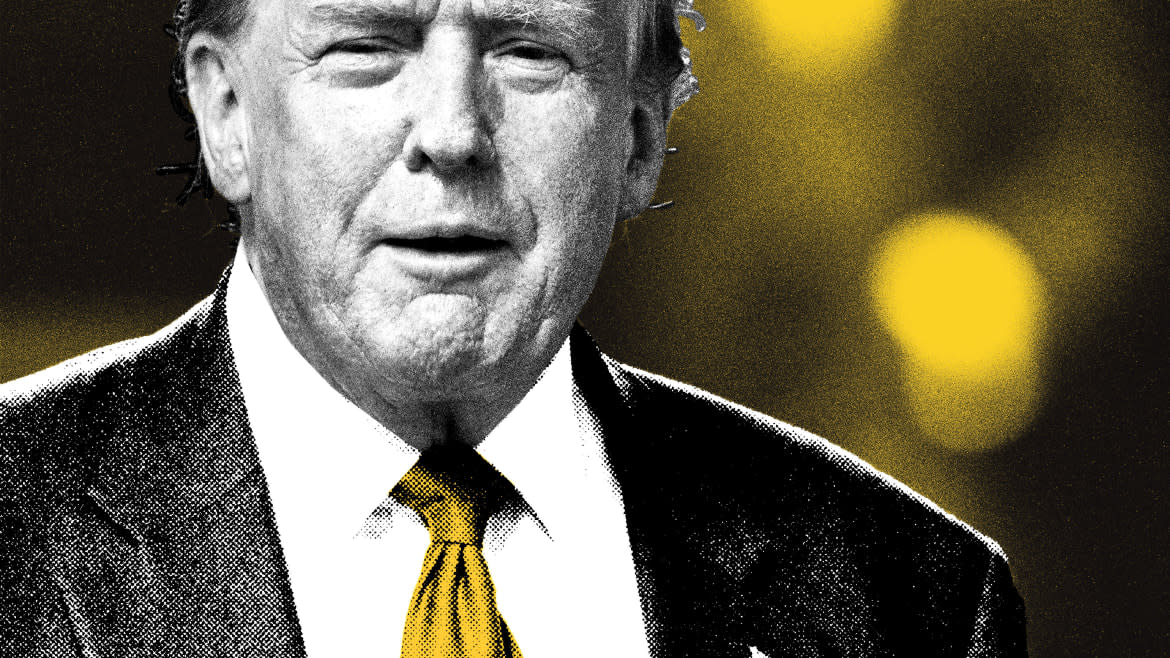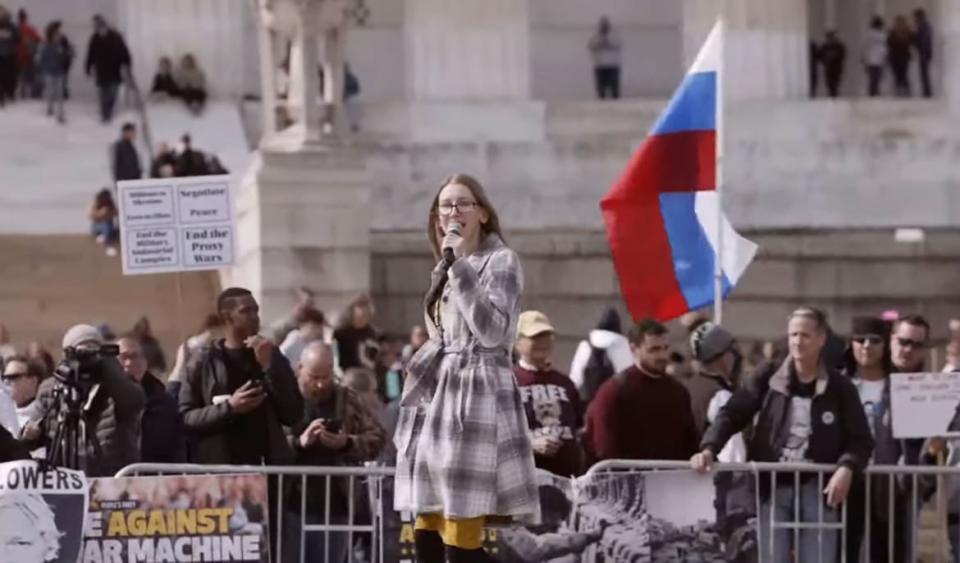Is the Libertarian Party Too Bigoted Even for Trump?

On Wednesday, the Libertarian Party made an eyebrow-raising announcement about its upcoming convention: the headline speaker will be Donald Trump. For the little-noticed third party, which has mostly been overshadowed this year by more prominent independent candidates, it was certainly an attention-grabber.
It is unusual, to say the least, for the presumptive Republican nominee to speak at an event which is also slated to nominate a candidate to run against him. It’s also bizarre given that Trump is, by any measure, the exact opposite of an ideological libertarian. But beneath the incongruity, there is a certain logic on both sides of this odd exchange.
Trump, for his part, obviously seeks to undercut a perceived spoiler threat. In 2020, the Libertarian candidate Jo Jorgensen exceeded Biden’s margin of victory over Trump in several swing states. Trump has also previously complained that his loss of the national popular vote in 2016 can be pinned on Gov. Gary Johnson’s Libertarian bid, which set a record for the party by taking 3.2 percent of the popular vote.
Libertarian Party Embraces Remorseless QAnon Shaman’s Run for Office
Republicans have long seen the Libertarian Party as costing them winnable elections, pulling away more GOP-leaning voters with its small government message.
For its part, the Libertarian Party ain’t what it used to be.
Through most of its history, the L.P.’s free-market fundamentalism was paired with similarly radical social liberalism, advocating an open borders immigration policy, drug legalization, and LGBT rights.
But in recent years, the party was subject to a hostile takeover. Out went the traditional live-and-let-live tolerance, to be replaced with culture warriors drawn from the fever swamps of the alt-right and its allies. So it’s not entirely surprising that the new management has turned the party’s convention into a literal Trump rally.
The L.P.’s internal turmoil, in and of itself, can be rather tedious and of little interest to outsiders. But the Trump campaign might end up wishing they’d taken a closer look before accepting this particular invitation. In rushing to accept the implicit endorsement, they’ve put their candidate on what might be the most overtly bigoted stage of his career.
Hate on Parade
In 2017, when then-President Trump was offering his infamous take on the “very fine people” at the deadly white supremacist rally in Charlottesville, others were playing out a similar reaction in miniature. The Libertarian Party’s leadership— including its national chair at the time, attorney Nicholas Sarwark—had emphatically denounced the chants of “blood and soil” and “Jews will not replace us.”
Within days, an organization called the Mises Caucus was founded with the purpose of expelling such “woke” sentiments from the party. In a sick bit of irony, they took their name from free-market economist Ludwig von Mises, an Austrian-born Jew who fled the Nazis.
Did Putin Astroturf the Libertarian Ron Paul Revolution?
The caucus began taking over state parties, packing members into sparsely attended conventions. As they did so, they quickly started attracting negative attention for saying (mostly via party Twitter accounts) things that sounded less like liberty and more like the tiki torch brigade. Examples included equating COVID vaccines to the Holocaust with yellow Star of David patches, denouncing Pride Month as “degeneracy,” and telling a Black politician to pick cotton and go back to Africa.
Things came to a head in 2021, when a vote to expel the New Hampshire party over such antics failed on the party’s national committee. In response, most Mises Caucus opponents walked out. Joe Bishop-Henchman, a nationally respected tax policy expert who’d been elected chair of the national committee in 2020, resigned in protest, writing that he would not “chair a party that has knowingly and now affirmatively chosen to stay affiliated with the toxic garbage being spewed” by Mises Caucus-controlled states.
A year later, the caucus took control of the national party at its 2022 convention. Their first order of business was to delete a nearly 50-year-old platform plank condemning bigotry as “irrational and repugnant.”
The new chair, Angela McArdle, defined the new mission as fighting “wokeism.” In practice, this meant saying outlandishly racist things and then playing the victim when anybody objected.

Angela McArdle at the Rage Against the War Machine rally in 2023.
Background Check
The remade Libertarian Party embraced a wide range of bigotries, with a particular zeal for overt antisemitism. It also suffered a collapse in membership, revenue, and vote totals as longtime Libertarians fled.
McArdle, in an interview on Tim Pool’s podcast, eagerly promoted the “German New Medicine” conspiracy theory, which holds that Jewish doctors deliberately give white people cancer. She defended the Mises Caucus headlining a virulent Holocaust denier at its events by pivoting to praise him as a “truth-seeker” willing to ask “why Jews control Hollywood.”
The national party tweeted a version of the notorious “Happy Merchant” anti-semitic caricature to allege a link between Ukrainian president Volodymyr Zelenskyy and disgraced con artist Sam Bankman-Fried, who have nothing in common other than both being Jewish. The party has long opposed foreign aid in general, but talk of Israel in particular soon leaned into the dual loyalty trope with statements such as “Israel First is America Last.”
This is the organization whose stage the 45th and would-be 47th President of the United States has eagerly agreed to share.
In his statement accepting the invitation, Trump praised the party as “some of the most independent and thoughtful thinkers” and urged them to help him “defeat President Biden.”
‘Libertarian’ Republicans Love Local Control, Unless It’s About COVID Safety
It would be fair to say, for all his controversies and own problematic statements over the years, Trump has never spoken to such an openly bigoted organization before. This is less like the “very fine people” comment and more like if he’d showed up himself to speak at the Charlottesville “Unite the Right” rally. It is particularly notable at a time when Trump and his fellow Republicans have been eager to denounce alleged antisemitism on the left in context of the war in Gaza.
It might be unsurprising that a party transformed into (for all intents and purposes) a hate group would accept Trump’s seal of approval. But it’s less clear if Trump, or his campaign staffers, knew what he was signing up for. The embrace of such an organization by a normal presidential candidate would be a major scandal.
It remains to be seen if, for Trump, it even gets noticed.
Get the Daily Beast's biggest scoops and scandals delivered right to your inbox. Sign up now.
Stay informed and gain unlimited access to the Daily Beast's unmatched reporting. Subscribe now.


